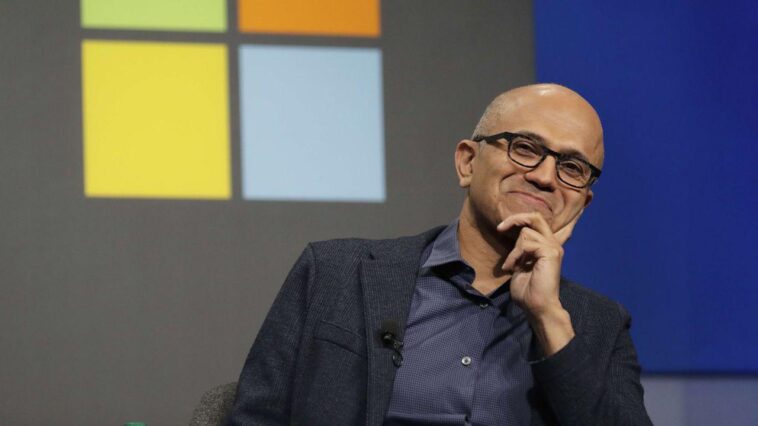Second Google Search Wars
The Google Dance was something that marketers and search engine optimizers used to closely monitor in the past. Google’s renowned search algorithm is continually adjusting its ranking as the World Wide Web continuously grows with new websites, pages, and domain additions and deletions. It snoops through these websites, evaluates their usefulness, looks for fraud, and adjusts the order of the sites that display on its page. The so-called Google Dance looks like this.
When Satya Nadella, the CEO of Microsoft, updated the description of the Google Dance and said in an interview, “I’m hoping that thanks to our invention, Google will be eager to demonstrate their dancing skills. We made them dance, and I want everyone to know that.” On this day, Microsoft and OpenAI unveiled an enhanced version of the Bing search engine that combined conventional search with ChatGPT’s amazing generative AI capabilities. In search, Nadella declared it a “new day,” laying down the challenge to the “800-pound gorilla,” and igniting the Second Search Wars.
First Search Wars
When Steve Ballmer and Microsoft introduced the search engine Bing to compete with Google, the First Search Wars began. Through a combination of better search results and a lucrative business strategy, Google has completely eliminated other search engines like Yahoo, Lycos, and Excite to establish a virtual monopoly.
The Bing-Google search war was a bloody conflict waged in the trenches of technology, much like the First World War. Google triumphed, maintaining its dominance over 90% of the search industry while also surpassing Microsoft in terms of sales and profitability. Bing still remains, although as a very subpar second option, as Microsoft pledged to fight on. This is the reason for Nadella’s overt joy when he announced the Second Search Wars.
The German blitzkrieg that launched the Second World War stunned the world with its execution and overwhelming speed as its tanks and artillery swept into many European nations.
Microsoft launched its own blitzkrieg in the Search battle by swiftly integrating OpenAI’s revolutionary ChatGPT into its platforms, including Bing, the Azure cloud, Github, and its core Office suite. Having patiently collaborated with OpenAI since 2019 and invested in them to help them create their cutting-edge goods, it now raised the ante with a rumoured $10 billion investment. The scope and quickness of its implementation have surprised the tech industry, demonstrating how well the patience has paid off. Tech gurus are extolling the virtues of how startups might benefit from Microsoft’s agile operation.
A ChatGPT-style model will never completely replace Search, so Nadella and Microsoft aren’t only playing to win in search. With $225 billion in sales, Google’s search business dwarfs Microsoft Bing by a factor of more than 20. Google has the benefits of significant network effects, better infrastructure and technology, and a name that has grown to be associated with search thanks to its 8.5 billion searches each day. It also boasts impressive AI skills; in fact, its renowned Search laboratories were responsible for “inventing” transformers before OpenAI and GPT3, and it is the owner of DeepMind, perhaps the world’s greatest deep learning firm. It has a ChatGPT-killer with it and will soon see the rebirth of Bard as LaMDA, or Language Model for Dialogue Application. Even if each percentage point of market share that Google gains is worth billions of dollars in revenue, Microsoft’s strategy is more complex.
As a Twitter critic put it, Satya Nadella is “playing 3D chess.”
The fact that Microsoft has market-leading, very lucrative growth companies in corporate software, the cloud, and gaming is the key to this game. Just over 5% of its total income come from search. Contrarily, search advertising accounts for 80% of Google’s overall income and virtually all of its profits. Given that it lost approximately $500 million in Q4 2022, it is extremely possible that its other significant companies, like as the cloud, would also experience losses. Its investments in other businesses, namely cloud, are boosted by the large income stream of search.
Google makes a lot of money from search advertising, and Microsoft now wants to take it on head-on. In an interview with the Financial Times, Nadella said as follows: “From now on, the [gross margin] of search is going to decline permanently.” With the help of OpenAI innovation and the hyperscale of Microsoft’s software offerings, it will be possible to steal people away from Google. It will also subsidise marketers in whatever way possible since it has nothing to lose. Nadella mentioned this once again in his FT interview when he said, “Such a margin exists in search, and it is incremental for us. For Google, it is not; they must protect everything.” This “asymmetric” competitiveness is what makes Microsoft’s jujutsu manoeuvre possible. Microsoft attacks Google asymmetrically as it reduces overall search profits. That may have an effect on Google’s investments in other industries, such as cloud computing, where it is engaged in a fierce competition with Microsoft for the number two spot. Google has been using its search income to subsidise its cloud development, but that source of funding may soon run out. Microsoft continues to generate profits from its software and gaming divisions, which more than make up for its tiny search losses. This is Microsoft’s brilliant tactical move in the “3D chess game.”
The well-known Innovator’s Dilemma may potentially be depressing for Google. Its industry-leading advertising business model works well with the way search is now set up, which is as a large database of searchable information. It is uncertain if search can be monetised in the same manner as it is now if it becomes more conversational. Therefore, Google has a financial stake in the failure of ChatGPT or Bard-style conversational search, which is the classic innovator’s conundrum. Finally, Google is not in the greatest position at this time since regulators and governments from all over the globe are surrounding the company in an effort to limit its near monopoly in a number of IT sectors. Competition would be welcomed and encouraged.
Also read: Joe Biden, Macron, Rishi Sunak hail Air India’s ‘historic’ multi-billion dollar deal
Even while it’s amazing to observe, there are a lot of things that might prevent Microsoft from achieving its goals. As I have said, it is dangerous to underestimate Google. It boasts a wealth of resources, skill, and creativity. Additionally, it’s likely that services like ChatGPT are just a fad, and the initial enthusiasm may soon fade. The major battles will then be waged in the mobile market, where iOS and Android are both powered by Google for search. Finally, generative AI models will face significant ethical challenges including prejudice, plagiarism, the creation of false news, environmental devastation, etc. that might impede or even end its development. Satya Nadella seems to be developing into a great jujutsu practitioner, while Sundar Pichai may still be the sumo wrestler who is still standing and unbeaten.




